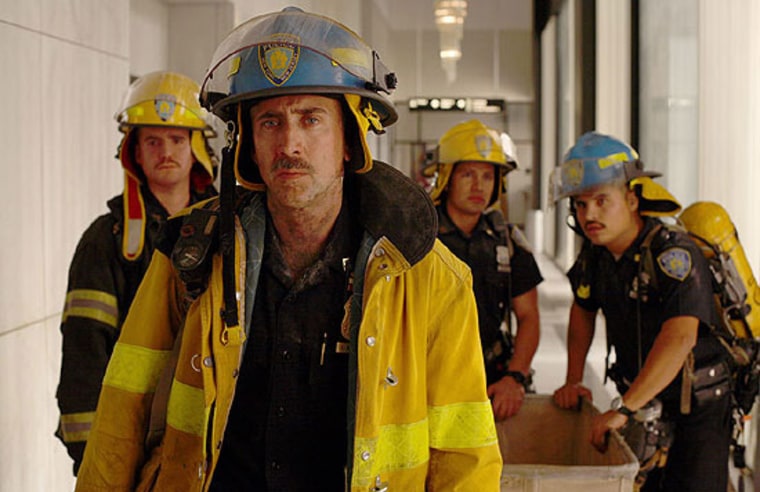Not all 9/11 stories are created equal. There is, for example, something inherently dramatic about the doomed flight of United 93 — which became the basis of a powerful movie of that name just a few months ago.
But the predicament of two Port Authority policeman trapped in the rubble left by the twin towers is not as easy to dramatize. Oliver Stone’s “World Trade Center,” written by first-time screenwriter Andrea Berloff, takes 129 minutes to tell their story, which is essentially about waiting.
The policemen, John McLoughlin (Nicolas Cage) and Will Jimeno (Michael Pena), spend most of the movie waiting to be rescued while their hopes dim. McLoughlin’s anxious wife Donna (Maria Bello) and Jimeno’s very pregnant wife Allison (Maggie Gyllenhaal) wait to hear if their husbands have survived the disaster.
Unable to move and fearing the worst, the men stay awake by trading banalities and remembering their rather generic families. Jimeno claims to have been visited by Jesus — unfortunately illustrated as an ambiguous blob of light — while McLoughlin indulges in a hopeful bit of marriage counseling. Cage and Pena work hard at sustaining these scenes, but they’re hamstrung by the physical limitations of their characters.
The women are more interesting, partly because they get to interact with friends, kids, neighbors and well-wishers. Bello emphasizes Donna’s impatience as well as her grace under pressure. Gyllenhaal, who delivers the most arresting performance, makes the most of an episode in which the restless, emotionally suffocated Allison can no longer stay in her car to wait for a red light.
Also playing the waiting game are several policemen and an ex-Marine who risk their lives to determine if anyone is left alive in the rubble. The actors in these roles are often minor celebrities (Stephen Dorff, Frank Whaley) whose familiar, grit-covered faces distract rather than add to any sense of authenticity. (“United 93,” cast with unknowns, did not make this mistake.)
Claustrophobia dominates the final three-quarters of the movie, which often suggests a mining-disaster drama rather than a 9/11 chronicle. The first half-hour is filled with infinitely more dramatic sounds and images: the surreal shadow of a plane headed for its target, a sudden thud that announces the arrival of the hijackers, the chaos and carnage inside the falling towers.
Stone is at his best with these scenes, which demonstrate the helplessness of the people crushed in the towers, who literally did not know what hit them. Rumors circulate, of a plane hitting the second tower, or a missile attacking the Pentagon, but communication is consistently presented as haphazard and difficult to act upon.
As the 9/11 anniversary approaches, and a famously perverse columnist dares to trash the 9/11 widows (“I’ve never seen people enjoying their husbands’ deaths so much”), it’s good to be reminded of what exactly happened on that day. The movie’s strongest emotion is nostalgia for a time of national unity, when such callous statements would be rejected automatically.
But “World Trade Center,” once it moves past the shocking events of 9/11, lacks narrative momentum. The inexperience of its screenwriter shows in the domestic scenes, which Stone directs in such a timid fashion that the picture threatens to turn into soap opera. Utterly missing is a motive, which “United 93” clearly and concisely established as Islamic fanaticism.
